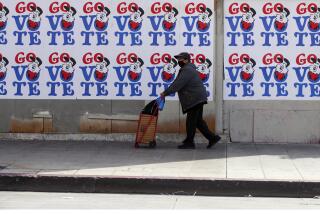Your vote, L.A.’s future
- Share via
Think of last month’s election — with its presidential contest, its 11 statewide ballot measures, its additional three countywide questions, the district attorney’s race and voters’ first full-scale workout with the new district lines and the top-two primary — as kind of a walk-through. For Los Angeles, the big election comes March 5, with voting under way in less than two months.
The city is about to undergo a sweeping turnover in municipal government, electing a new mayor, deciding whether to keep or replace the current city attorney, choosing a new controller and electing more than half — the controlling majority — of the City Council. Voters will also elect nearly half of the board running the Los Angeles Unified School District and nearly half of the trustees running the Los Angeles Community College District. They will decide whether to raise the sales tax, and in so doing will be making decisions about how the city deals with its deep fiscal problems and sustains an acceptable level of essential services, and how Angelenos test their leaders’ vision for civic life and their grasp of basic City Hall management. All county property owners will be asked — separately, on a different ballot, mailed to them and returned by mail rather than dealt with at the ballot box — whether to tax themselves for storm water cleanup and reclamation projects.
As voters consider a new mayor, they must ask what kind of city Los Angeles is and what they want it to become. It cannot be Chicago or New York or even San Francisco, where the mayor controls public health, welfare and jails — those are functions that Los Angeles, like most Western cities, cedes to county governments. It cannot be London or Paris or Shanghai, where the national government underwrites economic development and takes the lead on public works projects. And L.A.’s mayor, if he or she is to have influence on schools, must do it with strategy, wisdom and political clout rather than by fiat, because city government here has no formal role in running schools.
But the mayor owns the biggest block of votes at the Metropolitan Transportation Authority and so has an enormous role in transportation planning and spending well beyond the city limits. If the mayor is a person who knows and understands how to build relationships with other governments, he or she can harness the power of money and political silo-busting to go well beyond the confines of the basic job description and get federal resources for job growth and infrastructure, county coordination on ending homelessness, poverty and crime, and hyper-local buy-in on improving the quality of life in the city’s neighborhoods.
But none of that can happen unless the mayor is also a person with the smarts and the courage to keep the city solvent, and to decide when and how to trade off essential city services: more building inspectors, for example, in exchange for fewer police officers? Better emergency response times but fewer graffiti abatement contracts?
The Times’ editorial page delves deeply into the qualifications and governing philosophies of the candidates, but to do that we must explore more fundamental questions: Is Los Angeles the city people think it is? Are we wealthy or poor? How close to bankruptcy is our government? How did the nation’s leading manufacturing region a generation ago become its leading locus of working poverty? Did we make poor decisions, and if so, how do we avoid making them again? Or was it something that simply happened to us — and what else is headed our way that, this time, we may better prepare for? Are we older or younger, emerging or retrenching, healthier or sicker, safer or more endangered, more diverse or more segregated — or both — than the Los Angeles of post-riot, pre-earthquake 1993, or the Los Angeles of 20 years before that elected Tom Bradley and, soon thereafter, supported Howard Jarvis? Are we a global city, with intimate social, financial and political connections with the great cities of Asia, Latin America and Europe, or are we a collection of inward-looking suburban villages?
Knowing who we as a city are and where we want to go, we can better make demands of those who seek to lead our government.
That’s true not just for the mayoral candidates but for City Council candidates as well. Each council member represents a quarter of a million people and has enormous influence over how city services reach them, what gets built in his or her district, and how easily they can go about the business of living, working and creating.
For candidates, campaign season has been in full swing for more than a year as they have sought contributions, filed their declarations and spoken at candidate forums in rec rooms and school auditoriums around the city. For the closest watchers of civic affairs, it heated up simultaneously with the state elections as would-be, could-be candidates dropped out or flirted with getting in and made their plays for high-level political endorsements. Now, just before the holiday lull, there are hints that full-scale campaigning is around the corner. There have been many mayoral candidate forums, but the first televised debate aired Saturday night.
The conversation is already in progress. As it becomes broader, more thoughtful and, at times, more heated in January and February, Angelenos are urged to participate with The Times’ editorial page online and to follow the discussion in print through the March election and the runoffs to follow on May 21.
More to Read
A cure for the common opinion
Get thought-provoking perspectives with our weekly newsletter.
You may occasionally receive promotional content from the Los Angeles Times.









